QuestionVista, Ca 92084, 20 miles from San Diego Id appreciate your help with a Vet
-------------------------------------------
The text above is a follow-up to ...
-----Question-----
What size cage is to her best intrest just to sleep in. I took her to the vet
recently and they took her in the back I waited like 40 minutes I finally said I
want her back becuase she cannot be in a cage that long, the vet assistant
showed me her cage was full of feathers that she had pulled out in that 40
minutes. All appliances are disconnected, no cooking while shes in the
kitchen or living room and nothhings left on the counter. Do u think she
would benifit from
vitamins-------------------------------------------
The text above is a follow-up to ...
-----Question-----
Now I understand why shes ascting as a child. Ok Perfect Ill follow your
directions. Also another question. Ive had Dory for 6 months she has all her
feathers now and on a pellet diet with fresh foods and fruits daily. You
mentioned a cage, after I saw her conditions when I went to the home to
purchase her I couldnt find myself able to put her in a cage. She doesnt Have
one I have a large perch with tree branches that takes up 1/2 my kitchen.
Shes stays and sleeps on that, plus shes with me half the day off the perch,
she showers in the shower, thats her favorite. When I bought her she had
never touched water so you can imagine her excitment. Am I going to mess
up her breeding season even though she doesnt have a mate?Will she lay an
egg still? Where would she? She can get off the stand if she wants she has a
long steel latter to walk up and down but she never uses it. I cant bring
myself to put her in any type of cage after what I saw her in it has truley
scarred me, I just cant do it to her.
-------------------------------------------
The text above is a follow-up to ...
-----Question-----
I rescued a bald McCaw who was very abused. Very thin,Very unhealthy all the
way around. Shes now 100 % all feathers back gained weight, beaks good,
skin everything.The old owner purchased her from a breeder and according
to the paperwork handed the bird over to be hand fed by the new owner. Now
Dory (McCaw) is behaving like shes an infant bird. She sticks her beak in my
mouth and tries to regurgitate in my lips she wont stop, when i give her food
she bends the neck back and acts like Im spoon feeding her, she stays fluffed
up sways back and fourth and makes a baby bird skwak. All Day From wake
up til Bedtime whats going on she acts like a newborn
-----Answer-----
It's not at all unusual for a formerly abused macaw to do this and hopefully
it's not permanent mental impairment. Some of these magnificent parrots
have been known to become clinical insane from lack of challenges,
interaction and space. The most positive things you mention is how she's
recovered her feathers and weight.
Some of the behavior may be bonding/nurturing (her trying to feed you),
which means she's identifying you as her mate. Discouraging this is
important since she may end up egg laying - and that's a health risk, even in
mated macaws.
When she tries to feed you, 'politely decline' by moving on to another
activity. Don't discipline her or yell, we try not to use the word "no" except for
very important things like "NO biting" - but a distraction with a reward in
your bird's case should work well.
Give her a peanut or sunflower seed (both of these should never be fed
regularly, but used as single treats only now and then) as you begin an
alternative activity.
When she tries to pump food from you (neck back, like a baby), bring your
hand down and under - so she has to take it from you like a 'big girl' and
praise her when she does so.
The ongoing baby 'schwaawk' noises are more difficult to control than the
behaviors you've mentioned. They can be awfully frustrating.
The hard part is that when you give them direct attention, they tend to stop;
however, by doing this, you're teaching them that there's a reward for the
constant drone of noise. Ignoring it doesn't seem to work either because
they can keep it up as a self-soothing squawk for the entire day.
Some birds eventually out grow it; others do it for life. I'm sure that's not
great news, but the majority of owners who keep these guys anyway claim
that THEY get so used to it that they don't even hear it anymore.
Dory is a truly blessed bird having found you. With another 60 or so years
left to live, you must remember that really IS still a little girl at this point and
still learning. Just be patient, give her lots of affection and daily attention. Be
sure to get her out of cage for no less than 2 hours a day, preferably much
longer - and keep her challenged.
Take a look at our site for more information about exotic bird care - and see
some pics of our own rescues, including Sadie, a blue and gold macaw that's
our best success story!
www.4AnimalCare.org
-----Answer-----
You have a tremendous heart and I'm so very happy to hear that you have this
macaw now - the more I hear about what she came from and how you're
treating her - it's a true miracle.
I understand how you feel about cages and I've seen some pretty horrific
things too. Umbrella cockatoos who were put in canary cages as babies and
spent years in them, needing the cage cut away in order for rescuers to get
them out. Magnificent macaws kept caged for lifetimes in hotel lobbys as a
'decoration' or 'theme'. Many, many more truly sad stories. BUT - we try to
focus on the positives - like YOU and Dory! : )
Your daytime arrangement seems excellent. Near or in a kitchen, please
make sure she's not exposed to any teflon. No drip pans under your stove's
burners, no pots/pans or even the linings of many toaster ovens and other
cooking devices. Ideally, she should be removed while any cooking is going
on - and we've got some ideas for you on that.
One is what we call the "boingy perch". This is a big, spiral rope perch that
you can hang from a secure hook in the ceiling, just about anywhere. With
some newspapers underneath and a few toys (wood chewies) hanging from it
- Dory can move up and down and all around the twists and turns while still
feeling free. We hang a couple of them within about a foot of each other and
our birds can travel from one to the other at will. It also mimics native jungle
fines and branches that they'd encounter in their rain forests.
We have homemade portable perches we slide up to the boingy when it's
mealtime (and we slide them away afterwards or one of our girls slides down
the pole like a fireman and gets into too much trouble).
Other keepers have suspended natural wood in a trapeze like arrangement
from secure hooks in upper sides of walls or ceilings. To keep the bird from
climbing up the ropes or wires used for suspension, they slide 1" diameter
pvc piping over the rope/wire and the bird can't get a grip to climb up (or bite
through). Very neat idea!
When it comes to the cage - I do suggest one for nighttime. I keep my girls
in their own separate beds (cages) in my bedroom for night - with covers that
encompass all but about 1/2 of their front doors. This helps regulate their
'daylight' hours and avoid egg laying behavior, aggression, etc..
They should have 12 hours at least of 'nighttime', up to 14 (but no more
than that). I keep them on a 12 hour routine year 'round.
The nighttime cage needn't be big - it's just for sleeping. One perch,
preferably a nice comfy rope perch is all that's necessary, a small amount of
food and of course plenty of water. I also hang a "snuggly" for them - which
can be an old, clean, soft sock or fluffy piece of towel. Birds tend to like
having 'something' touching them while sleeping (in the wild it would be their
parent, sibling or mate). Since they also tend to sleep in hollow trees, the
night cage is a comfort.
Come morning, it's a happy time when we all vocalize and my B&G calls me a
"Furkey" (her word for turkey).
We then go out to our daytime perches and have a nice whole grain breakfast
- and our day officially begins. When it's bedtime, I announce "Bedtime" and
these girls stop what they're doing and start a race down the hall to the
bedroom. It's so funny watching them running, sometimes laughing as they
go, looking forward to that nighttime cage and their safe, secure downtime.
OK, this is far too long - let me know if there's anything else - I'm here to
support you and Dory!
-----Answer-----
A cage that's as big as you can afford - and at least big enough for her to be
able to turn around in without her tail feathers touching the sides or bottom -
is the rule of thumb we use.
Again, it's just for her sleeping security and for any time she needs to be
protected. There will be some times she shouldn't be out in the open. What if
something takes you away for a day or two and someone else has to care for
her? She can become pretty intimidating or even aggressive in the presence of
a stranger in 'her' home.
As for that vet taking her back anywhere without you? Huh? A good avian vet
not only encourages the human companion to accompany the bird - but
RELIES on that human to keep the bird's stress level down and make
examination easier.
There are some exceptions to this of course. You may want to look for
another vet ?
What city/state are you in - I'll see what I can find
AnswerJeffrey Jenkins, DVM
ABVP, Avian & Exotic Animal Hospital
2317 Hotel Circle South, Suite C
San Diego, CA 92108
Practice limited to birds & exotic animals
(619) 260-1412
FAX: (619) 260-1499
Also, check this link: http://www.parrotconnection.org/reading_room/vets_list.html

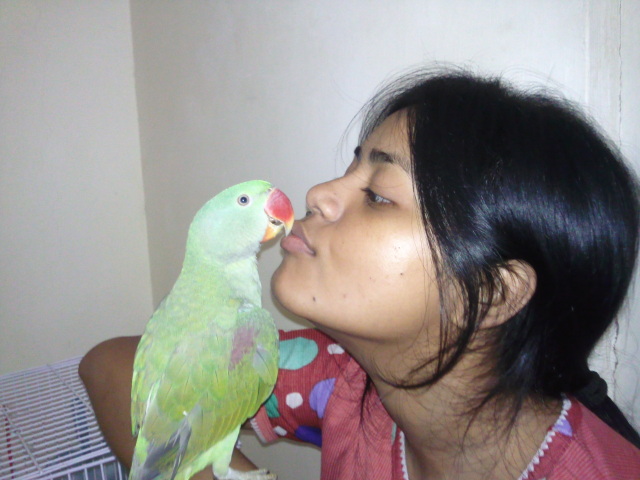 can i give my parrot chole(chana) called in hindi
Question
my little chaddi alexa
dear sir,
can give chan
can i give my parrot chole(chana) called in hindi
Question
my little chaddi alexa
dear sir,
can give chan
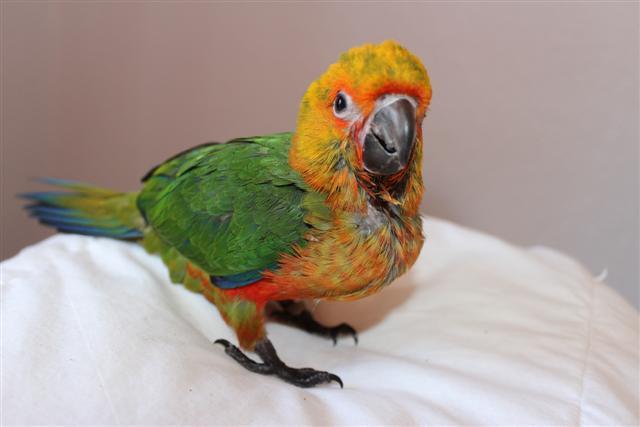 Jenday Conure Weaning?
Question
Castor the Conure
Hi
I have a 9 week o
Jenday Conure Weaning?
Question
Castor the Conure
Hi
I have a 9 week o
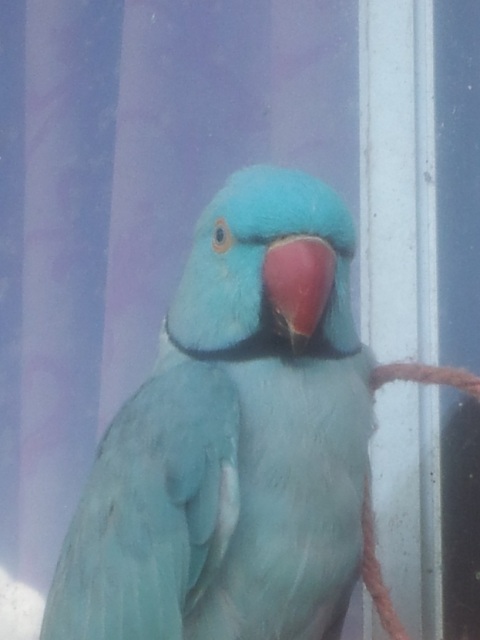 RE: Indian Ringneck probems
Question
Indy our Ringneck
Thank you for your he
RE: Indian Ringneck probems
Question
Indy our Ringneck
Thank you for your he
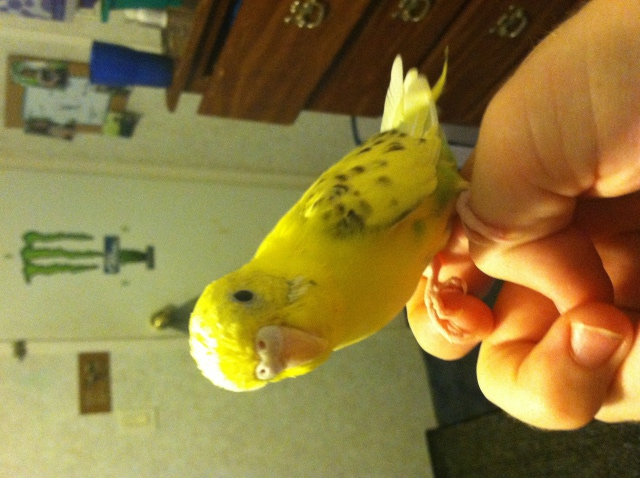 Parakeet gender
Question
Parakeet
Hi, I looked for an expert und
Parakeet gender
Question
Parakeet
Hi, I looked for an expert und
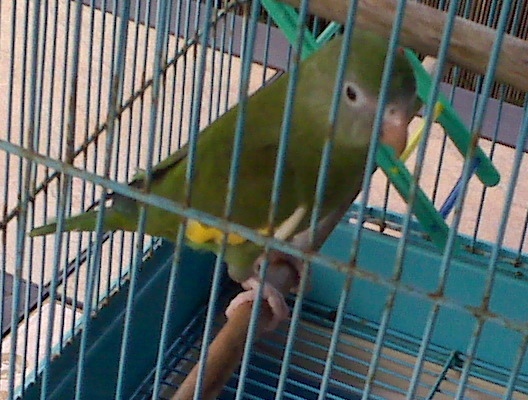 What type of parrot is this?
Question
Friendly bird
A week ago ths small parrot flew
What type of parrot is this?
Question
Friendly bird
A week ago ths small parrot flew